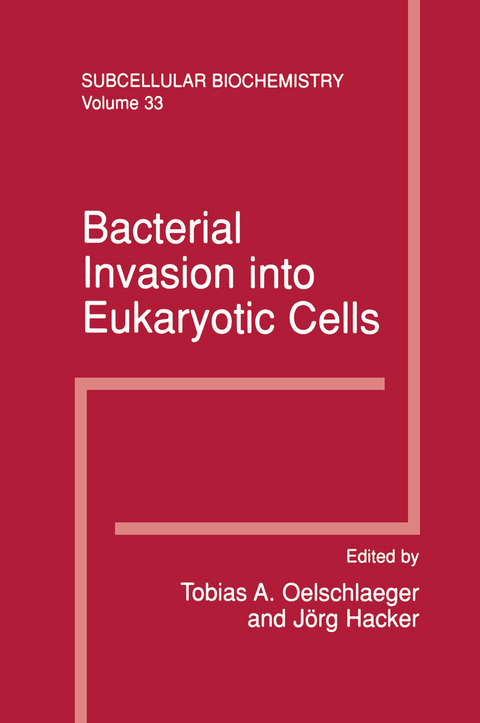
Bacterial Invasion into Eukaryotic Cells
Kluwer Academic/Plenum Publishers (Verlag)
978-0-306-46290-0 (ISBN)
Strategies of Bacterial Interaction with Eukaryotic Cells *Tobias A. Oelschlaeger and Jorg Hacker 1. BENEFICIAL BACTERIAL-HOST INTERACTIONS Already during birth and soon thereafter mammals are colonized by bacte- ria belonging to the resident microbial flora. Cutaneous and mucosal sur- faces and the gastrointestinal tract are the areas which become colonized. These indigenous or autochthonous bacteria have a variety of beneficial effects on their hosts. They play a protective role by bacterial antagonism in fighting infections (Hoszowski and Truszczynski, 1997; Hentges, 1979). Pro- duction of vitamin K is another essential contribution of the resident microbial flora to the health of the host (Hill, 1997). Even more important, studies with germ-free animals demonstrated the involvement of the microbial flora on the development of the immune system. Such animals have underdeveloped and relatively undifferentiated lymphoid tissues and low concentrations of serum immune globulins ( Cebra et at., 1998). They TOBIAS A. OELSCHLAEGER and JORG HACKER Institut filr Molekulare lnfektionsbiologie, Universitiit Wiirzburg, 97070 Wiirzburg, Germany.
*Corresponding author; Phone: (0)931-312150; FAX: (0)931-312578; E-mail: t.oelschlaeger@mail.uni-wuerzburg.de xxix Tobias A. Oelschlaeger and Jorg Hacker also show defects in specific immune responsiveness and in nonspecific resistance induced by endotoxin, which may account for their lowered resis- tance. A more typical example of symbiotic interaction of bacteria with a host are bacteria like Ruminococcus in the gut of ruminants, essential for degradation of cellulose (Hobson, 1988). The closest benefical bacterial-host interactions are those of intracellular symbiotic bacteria and their host cells.
1 Microtubule Dependent Invasion Pathways of Bacteria.- 2 Interaction of Enteropathogenic Escherichiacoli with Host Cells.- 3 E. coli Invasion of Brain Microvascular Endothelial Cells as a Pathogenetic Basis of Meningitis.- 4 Host Cell Invasion by Pathogenic Neisseriae.- 5 Bartonella Interactions with Host Cells.- 6 Host Cell Invasion by Streptococcus pneumoniae.- 7 High Frequency Invasion of Mammalian Cells by ? Hemolytic Streptococci.- 8 Nocardia asteroides as an Invasive, Intracellular Pathogen of the Brain and Lungs.- 9 Mycoplasma Interaction with Eukaryotic Cells.- 10 Mycobacterial Invasion of Epithelial Cells.- 11 Invasion of Epithelial Cells by Bacterial Pathogens: The Paradigm of Shigella.- 12 Salmonella Invasion of Non-Phagocytic Cells.- 13 Salmonella Interactions with Professional Phagocytes.- 14 Interaction of Yersinia with Host Cells.- 15 Invasion of Mammalian and Protozoan Cells by Legionella pneumophila.- 16 Internalization of Listeria monocytogenes by Nonprofessional and Professional Phagocytes.- 17 Host-Plant Invasion by Rhizobia.- 18 Chlamydia: Internalization and Intracellular Fate.- 19 Interaction of Rickettsiae with Eukaryotic Cells: Adhesion, Entry, Intracellular Growth, and Host Cell Responses.- 20 Ehrlichial Strategy for Survival and Proliferation in Leukocytes.- 21 DNA Vaccine Delivery by Attenuated Intracellular Bacteria.- 22 Vaccines against Intracellular Pathogens.- 23 Identification and in Situ Detection of Intracellular Bacteria in the Environment.- 24 New Approaches for Diagnosis of Infections by Intracellular Bacteria.
| Erscheint lt. Verlag | 31.1.2000 |
|---|---|
| Reihe/Serie | Subcellular Biochemistry ; 33 |
| Zusatzinfo | XXXVIII, 688 p. |
| Verlagsort | New York |
| Sprache | englisch |
| Maße | 155 x 235 mm |
| Themenwelt | Naturwissenschaften ► Biologie ► Mikrobiologie / Immunologie |
| Naturwissenschaften ► Biologie ► Zellbiologie | |
| Naturwissenschaften ► Biologie ► Zoologie | |
| ISBN-10 | 0-306-46290-7 / 0306462907 |
| ISBN-13 | 978-0-306-46290-0 / 9780306462900 |
| Zustand | Neuware |
| Haben Sie eine Frage zum Produkt? |
aus dem Bereich


